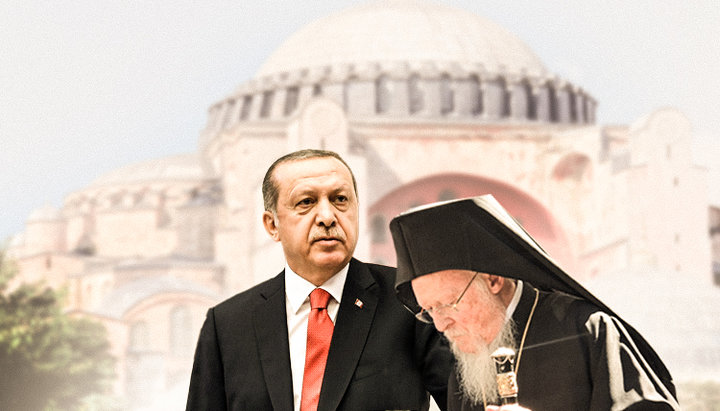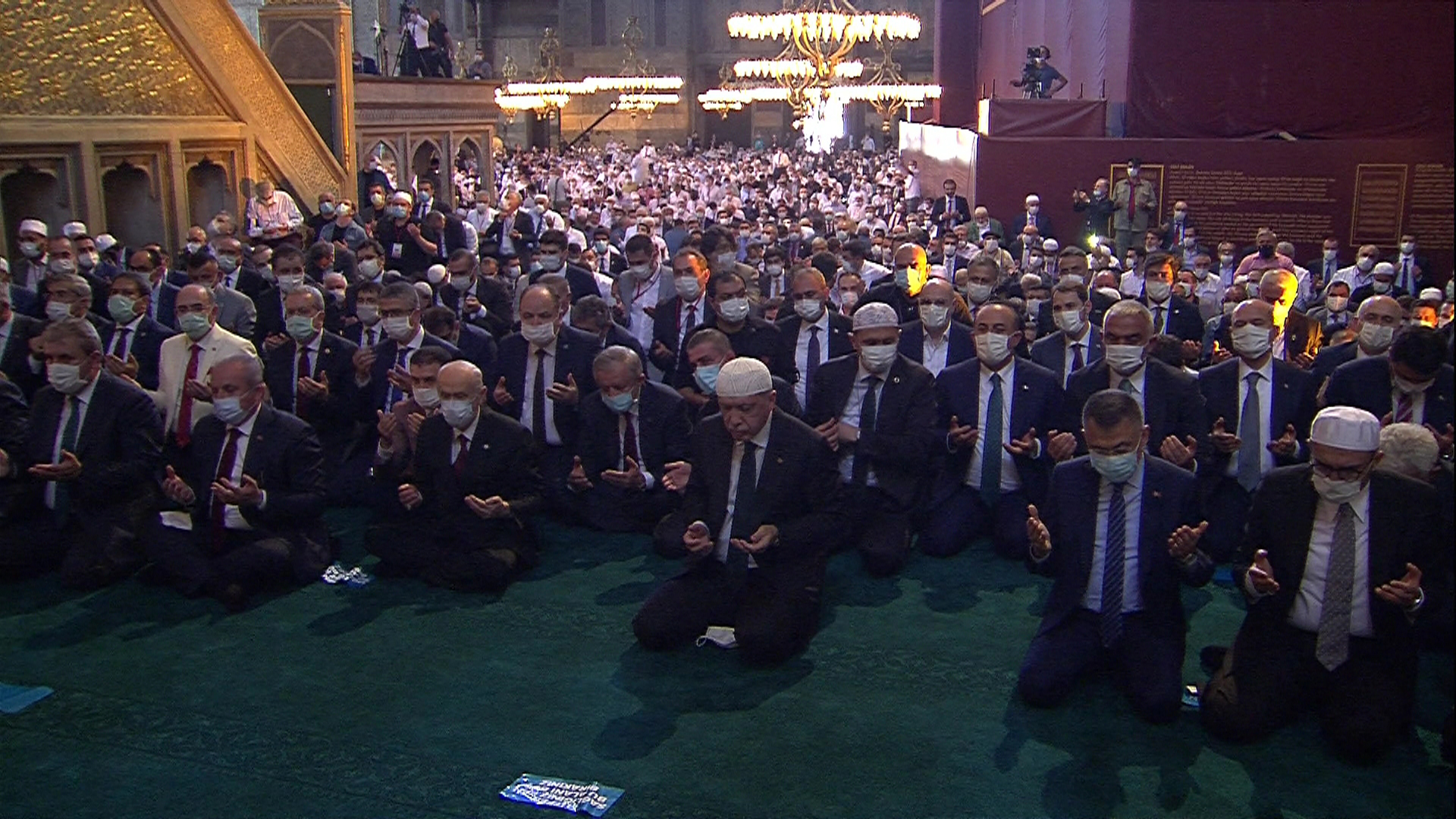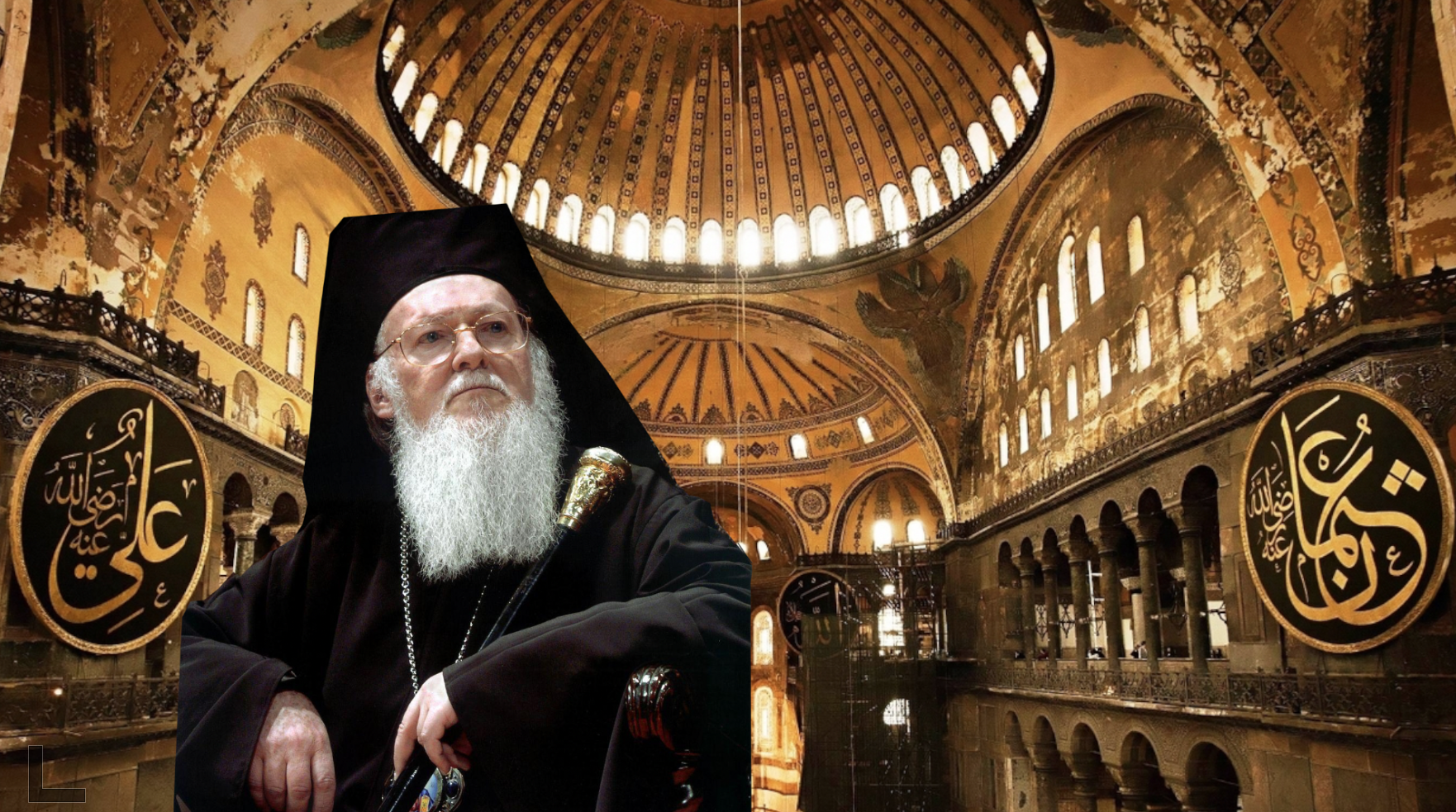Should the “Head of Orthodoxy” defend Orthodox shrines?

The Turkish power converted Hagia Sophia, the shrine of the Orthodox Church, into a mosque. Why did Pat. Bartholomew, “Head of Orthodoxy”, do nothing to prevent this?
Hagia Sophia in Istanbul, the main shrine of the Church of Constantinople, has again become the Hagia Sophia mosque. Turks are rejoicing, Christendom is grieving.
On July 24, the first Muslim service was held in the temple, which was attended by President Recep Erdogan. It was attended by 350,000 people. For the first time this year in Hagia Sophia, Muslims also celebrated one of the largest Islamic holidays, Eid al-Adha.

The St. Sophia temple was built in 537 to immediately become a unique shrine of the Orthodox world. It was the visit of the ambassadors of Prince Vladimir to the divine service in Sophia that became a decisive factor in the adoption of Christianity by Kievan Rus. In 1453, after the capture of Constantinople by the Ottomans, the St. Sophia temple was turned into the Hagia Sophia mosque and remained in this status until 1934, when the first President of Turkey, Kemal Ataturk, issued a decree on the transformation of Hagia Sophia into a museum. And now, 86 years later, this decree was canceled, and a Muslim prayer sounds again in the Orthodox shrine.
The current decision of the Turkish authorities has caused a storm of discussions. Some European countries, together with the Department of State, called on Turkey to reverse its decision; others say that the conversion of Sophia into a mosque is an internal affair of the Turks. But all these discussions can no longer change anything. The Turks made their decision.
But the question arises – was it really impossible to do anything to prevent desecration of the shrine of the Orthodox world? This question is primarily directed towards Patriarch Bartholomew, for whom the Church of St. Sophia is a symbol of the Church of Constantinople.
After all, now, almost 600 years after the fall of the Byzantine Empire, the Patriarchate of Constantinople has no reason to stay in Istanbul. None other than Hagia Sophia. This shrine is practically the only thing that connects the Church of Constantinople with the glorious past of the Christian empire given that now the Orthodox in Istanbul make up less than a hundredth of a percent of the total population of the city.
“Does such a high priest truly meet our need”?
We all know to what extent Patriarch Bartholomew is an active media figure. He regularly communicates with the world's leading politicians, fights to maintain the Earth's climate health and even participates in global economic forums where the world's richest people meet. It was consistent to expect him to take the most active actions to protect his shrine: these could be tough protest statements towards the Turkish authorities, calls for support to the presidents of large states and the heads of Local Churches, finally – cross processions along the streets of Istanbul, prayers at Hagia Sophia.
After all, talk about converting Sophia into a mosque had continued for a long time. Turkish President Recep Erdogan made relevant statements during several months. Over this time, it was possible to deploy a powerful protest movement around the world. Would this have caused Erdogan to reverse his decision? It's hard to say for sure, but it would have had a certain impact for sure.
However, no cross processions, no prayer services, or even a single protest from Patriarch Bartholomew followed. All this time, the head of Phanar remained completely silent. And only two weeks before the change in the status of Sophia, the patriarch timidly noted that he was disappointed by the upcoming event. And a week later, he said that Hagia Sophia is a place of encounter and solidarity between Christianity and Islam. This is more than a bizzare position of the patriarch who is being deprived of the main shrine of his Church.

But how is that? After all, the head of Phanar vehemently promotes the thesis in the world that he stands above all Orthodoxy. Let us recall his words: "Orthodoxy cannot exist without the Ecumenical Patriarchate ... If the Ecumenical Patriarchate ... leaves the inter-Orthodox scene, Local Churches will become "like sheep that do not have their shepherd".
But can “a shepherd, without whom Local Churches cannot exist”, cowardly remain silent when, before his eyes, an outrage against the main shrine of Orthodoxy occurs? After all, Hagia Sophia belongs not only to Phanar, it is the pearl of the entire Orthodox World. Do the Churches need such a shepherd? And what does his ministry consist of, apart from self-aggrandizement and claims to absolute power over other Primates? What deeds of the patriarch support these claims?
Being already aware of the impending desecration of Hagia Sophia, the patriarch, together with the authorities, obediently celebrates the anniversary of the failed coup in Turkey in 2016 – a coup, in which he is accused by the Turkish media. Could he have moved away at least from such humiliation?
Of course, we can assume that Patriarch Bartholomew feared the wrath of the Turkish authorities. But how can this anger manifest itself now, in the 21st century? In some kind of economic sanctions, expulsion from the country? Can a monk who has renounced the world and dedicated his life to God be afraid of this?
In fact, the threats used to be completely different.
There are a lot of examples of martyrs in history who suffered severely for their faith from the hands of the mighty of this world. There were also patriarchs among them, including those of Constantinople.
In 705, Patriarch Callinicus I, subsequently canonized by the Church of Constantinople, was blinded and immured alive in the wall by Emperor Justinian II for protests against the repression of the clergy.
In 1821, Saint Gregory V, Patriarch of Constantinople, was hanged by the Turks at the gates of the Patriarchate for supporting the Ottoman Greeks.
In 1599, Hieromartyr Nicephorus, locum tenens of the Constantinople throne, was martyred by Catholics in the Polish-Lithuanian Commonwealth for defending the Orthodox faith.
And we all know the fate of St. John Chrysostom, who was expelled from Constantinople by Emperor Arkady and died in exile.
Each of these and many other martyred first priests could choose subservience to the authorities or at least silence. But they acted differently.
However, maybe now are just different times, and it is not accepted to resist the authorities in the modern Church? Maybe, it’s necessary to obey and accept any anti-church actions of the rulers with humility? No. The times are always the same. And bishops either defend Christ's Church or defend their comfort and amenities in this world. One needs to look no further than Montenegro and Ukraine.
Do modern hierarchs cross politicians?
Metropolitan Amfilohije, the head of the Montenegrin Metropolitanate of the Serbian Church, has been leading protests against the actions of the local authorities for six months, which intended to confiscate its temples from believers. Podgorica hosts moleben prayers and protest processions twice a week, in which tens of thousands of Orthodox Montenegrins take part. Metropolitan Amfilohije is severe on the government, directly calling it godless and being not daunted by any persecution, although he already had to be interrogated at the police stations.
One can also recall His Beatitude Onuphry with the hierarchs of the UOC, whom Poroshenko rigidly enforced to join his fake church of the OCU. Despite the powerful pressure from the authorities, the calls to the SBU and lawlessness of activists, none of them backed down but continued to defend their Church.
Patriarch Bartholomew has a different tactic in dealing with the mighty of this world. Throughout his life, he has forged relationships with politicians in order to promote his interests with their help. And it did work quite often.
In 2018, the head of Phanar entered into an alliance with Poroshenko, and with the full support of the United States, by right of might, tried to seize the Church in Ukraine.
In 2020, the opposite situation developed. Having already turned Hagia Sofia into a mosque, the Turkish authorities acted by a privilege of power. Phanar was in the role of the weak party. The former allies did not help him. A US delegation led by the ambassador, accompanied by the imam, visited the Hagia Sophia mosque on July 29 and did not express any discontent.
It is significant that the logic of the Turks in this case was mockingly identical to the logic of the Phanar. Just as Patriarch Bartholomew canceled an ancient 300-year-old decree on the status of the Kiev Church, so Erdogan canceled Ataturk's decree on changing the status of Sophia from a mosque to a museum.
The situation with Hagia Sophia has once again demonstrated that Patriarch Bartholomew, entering into an alliance with some politicians and groveling in front of others, thinks and acts like a politician himself.
But the Church does not accept the categories of power, intrigue and benefit used by politicians. The law of love and truth operates in the Church. Both the Ukrainian and Russian Churches in the situation with Hagia Sophia condemned the actions of the Turkish authorities. The cathedral was built as an Orthodox church and the liturgy is to be served there.
His Beatitude Onuphry: “We pray that God will return it (St. Sophia temple – Ed.). We do not seize mosques and would like no one to seize our temples.”
***
If Orthodoxy were one, if Patriarch Bartholomew acted as a shepherd and not as a politician, it would be quite possible that the Hagia Sophia Cathedral could have been defended.
But time passes, politicians and hierarchs change and leave. This page of history will also turn over.
The Greeks have preserved a legend that on the day of the capture of Constantinople, at the moment when the Turks burst into the cathedral, the Divine Liturgy was going on in it and the priest with the Holy Gifts was already entering the pulpit. Then a part of the altar wall opened and covered the priest, who will stay in it until the church has been returned to the Orthodox.
And we believe that the ancient shrine of Orthodoxy will not just be freed from Muslims in due time. The Divine Liturgy will resume there, which was interrupted in 1453 by a crowd of Ottoman conquerors, and Orthodox worship will be held at St. Sophia until the end of time.











